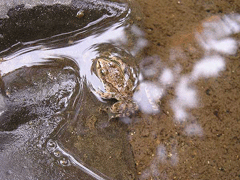What Calls Beneath
Air Date: Week of May 5, 2006

The Columbia spotted frog (Erik Hendrickson)
The Columbia Spotted Frog has an unusual way of communicating. Jeff Rice reports.
Transcript
CURWOOD: Some sounds are secret. A child whispers in another child's ear. A spy taps out a secret code. And nature is no different. As part of the Western Soundscape Project, Jeff Rice reports on one frog’s hidden messages.
RICE: The thing about frogs is this: you rarely see them. But they're loud when they want to be, and that's usually right around this time of year.
[CHORUS FROG SOUNDS]
RICE: I recorded these chorus frogs in northern Utah at a big marsh near the Great Salt Lake. This is their spring mating ritual, and they gather together in an amorous frenzy of loud choruses.

The Columbia spotted frog (Erik Hendrickson)
RICE: Nothing unusual here. Typical frog behavior.
But a little further up on the hillside, in the smaller streams and marshes, what is interesting is what you don't hear.
[FADE CHORUS FROGS]
RICE: There are these other frogs, Columbia Spotted Frogs, that don't do things in the conventional way. To hear them, you would have to stick your head – or a microphone – under the water.
[UNDERWATER FROG SOUND]
PLATZ: Most of the frogs I've been working with call several feet down and you don't hear anything in the air.
RICE: Dr. James Platz is a biologist at Creighton University in Omaha, and he travels around studying these underwater calls. He first discovered this behavior in frogs in 1989.
PLATZ: I was working in a narrow canyon and I spent most of the evening at a pond. There were no animals calling whatsoever. I must have been there until three or four a.m. in the morning. It was a soundless night. So I came back about 7 or 8 the next morning, and when we got there there were three egg masses.
RICE: Obviously the frogs had found each other to mate. The egg masses were proof of that. But what struck Platz as odd is that most frogs would have been calling out loud.
[UNDERWATER FROG SOUNDS]
PLATZ: And the following spring we took a hydrophone down and discovered to our pleasant surprise that they were quite noisy. They just called underwater.
RICE: Platz says the advantages could be many. By calling underwater, the frogs don't alert predators. They can also start the breeding season earlier because the water is typically warmer than the air.
On the other hand, without much of an above-ground call, these frogs can tend to get overlooked by humans. Destruction of their wetland habitats has led to severe declines in their numbers across several western states. Columbia Spotted Frog populations in southern Idaho and parts of Utah and Nevada are candidates for listing under the federal Endangered Species Act.
[UNDERWATER FROG CALLS]
RICE: For Living on Earth, I'm Jeff Rice.
Links
Living on Earth wants to hear from you!
Living on Earth
62 Calef Highway, Suite 212
Lee, NH 03861
Telephone: 617-287-4121
E-mail: comments@loe.org
Newsletter [Click here]
Donate to Living on Earth!
Living on Earth is an independent media program and relies entirely on contributions from listeners and institutions supporting public service. Please donate now to preserve an independent environmental voice.
NewsletterLiving on Earth offers a weekly delivery of the show's rundown to your mailbox. Sign up for our newsletter today!
 Sailors For The Sea: Be the change you want to sea.
Sailors For The Sea: Be the change you want to sea.
 The Grantham Foundation for the Protection of the Environment: Committed to protecting and improving the health of the global environment.
The Grantham Foundation for the Protection of the Environment: Committed to protecting and improving the health of the global environment.
 Contribute to Living on Earth and receive, as our gift to you, an archival print of one of Mark Seth Lender's extraordinary wildlife photographs. Follow the link to see Mark's current collection of photographs.
Contribute to Living on Earth and receive, as our gift to you, an archival print of one of Mark Seth Lender's extraordinary wildlife photographs. Follow the link to see Mark's current collection of photographs.
 Buy a signed copy of Mark Seth Lender's book Smeagull the Seagull & support Living on Earth
Buy a signed copy of Mark Seth Lender's book Smeagull the Seagull & support Living on Earth

